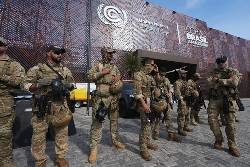BELEM, Brazil (AP) — Two global power players pushed negotiators on Wednesday to find compromises at United Nations climate talks in Brazil’s Belém, where a self-imposed deadline is rushing up fast.
U.N. Secretary-General Antonio Guterres and Brazilian President Luiz Inácio Lula da Silva arrived at the COP30 talks to take a hand. Lula's tentative schedule included meetings with negotiators for the European Union, emerging nations in Latin America, the Middle East and Asia, and hard-hit small island nations and African countries.
“The arrival of President Lula and Antonio Guterres is hugely significant and suggests the hosts think we should have some kind of deal passed today,'' said Mohamed Adow of the Kenyan environmental organization Power Shift Africa. “You don’t generally have the president coming into the talks midway through the second week, without something to show for it.”
Raising the possibility of a historic outcome, Greenpeace Brazil Executive Director Carolina Pasquali said: “The COP is nearing the endgame and the joint arrival of both Lula and Guterres gives a clear political signal that they mean business."
Excluded issues expected to be discussed
Wednesday is an important day in the plans of the Brazilians running the conference on the edge of the Amazon. Even though the talks are scheduled to go until at least Friday, COP30 President André Corrêa do Lago gave negotiators a Wednesday deadline for a decision on four interconnected issues that were initially excluded from the official agenda: whether countries should be told to toughen their new climate plans; details on handing out $300 billion in pledged climate aid; dealing with trade barriers over climate and improving reporting on transparency and climate progress.
Along with those four issues is a push by scores of countries, rich and poor, for a detailed road map on how to phase out fossil fuels. And that's key to the part about toughening new climate plans for a shot at limiting future warming to 1.5 degrees Celsius (2.7 degrees Fahrenheit), the global goal set in 2015's Paris Agreement.
Two years ago, after days of contentious debate, climate talks agreed to language calling for a transition away from fossil fuels — coal, oil and natural gas — but since that time, little has been done to clarify or amplify on that one sentence. Protesters inside and outside the conference venue kept pushing for a phaseout.
A group of scientists Wednesday criticized current proposals for a fossil fuel phaseout road map as inadequate.
“A road map is not a workshop or a ministerial meeting. A road map is a real workplan that needs to show us the way from where we are to where we need to be, and how to get there,” said a letter from seven prominent scientists, including some who are advising the COP30 presidency. “We need to be as close as possible to absolute zero fossil fuel emissions by 2040, the latest by 2045.”
Lula and fossil fuels
Lula, in talking to leaders earlier in Belem, boosted the efforts of coming up with more details on how to wean the world from the fuels that emit heat-trapping gases, the chief cause of climate change.
The Brazilian president has also been pushing for more participation in a new multibillion international fund financed by interest-bearing debt instead of donations, called the Tropical Forests Forever Facility. It seeks to make it more lucrative for governments to keep their trees rather than cut them down.
Iskander Erzini Vernoit, director of the IMAL Initiative for Climate and Development, an independent think-tank based in Morocco, said it won't be easy for Guterres and Lula to find common ground among negotiators.
“Various apparent impasses still remain, and chief among these from an African point of view is the unwillingness of the EU and other rich countries to engage on their obligation to provide climate finance," Erzini Vernoit said.
Implementation is key to cut global warming
Going into this two-week conference, Brazilian leaders emphasized the importance of focusing on implementation, starting action on agreements, targets and pledges already made, over new deals.
If nations met the goals set at past climate talks of tripling renewables, doubling energy efficiency and cutting methane by 2030, the rate of global warming could be cut by a third within a decade and a half by 2040, according to a new report by Climate Analytics.
Neil Grant, a climate policy analysis expert and lead author of the report, said this could rescue the goal set a decade ago in the Paris Agreement.
While climate leaders have conceded that the world is on track to overshoot this climate goal, Grant said: “We have the tools to transition away from fossil fuels. Although the hour is dark, we still have agency.”
“Right now in COP 30 in Belém, it’s our future that we’re seeing being played out,” said Dev Karan, a 17-year-old youth climate activist. “The decisions made right now on paper will in fact translate into the future that we’re going to experience one day.”
___
The Associated Press’ climate and environmental coverage receives financial support from multiple private foundations. AP is solely responsible for all content. Find AP’s standards for working with philanthropies, a list of supporters and funded coverage areas at AP.org.
___
This story was produced as part of the 2025 Climate Change Media Partnership, a journalism fellowship organized by Internews’ Earth Journalism Network and the Stanley Center for Peace and Security.
...


 Copyright © 1996 - 2025 CoreComm Internet Services, Inc. All Rights Reserved. | View our
Copyright © 1996 - 2025 CoreComm Internet Services, Inc. All Rights Reserved. | View our